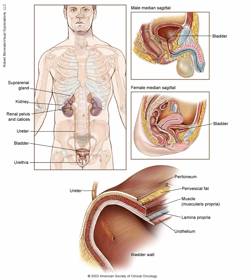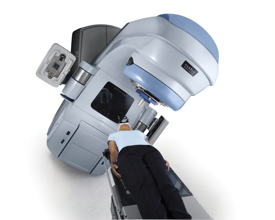
Facts About Bladder Cancer
- The American Cancer Society estimates that more than 67,000 new cases of bladder cancer will be diagnosed in the United States this year.
- Bladder cancer is four times more common in men than in women and two times more common in Caucasians than African-Americans.
- In the United States, bladder cancer is the fourth most common cancer in men and the eighth most common in women.
- The five-year survival rate for all types of bladder cancer is 82 percent. If the cancer is confined to the bladder (noninvasive), the survival rate is 94 percent.
About Bladder Cancer
The bladder is located in the pelvis. It collects and stores urine and has a muscular wall that allows it to contract and expand.
- About 90 percent of bladder cancers are transitional cell carcinoma. Squamous cell carcinoma, adenocarcinoma and small cell carcinoma account for the rest.
- Cancer that is only in the bladder lining is called superficial bladder cancer. More than 75 percent of bladder cancer is diagnosed as a superficial disease and has an excellent survival rate.
- Invasive bladder cancer penetrates the layers of muscles in the bladder and is more likely to spread to other parts of the body.
Treating Bladder Cancer
Treatment options are based on the type of cancer, your age and your overall health. Bladder cancer, if caught early, can often be cured. The main treatments include:
- Surgery by a surgical oncologist or urologist to remove the cancer or possibly part or all of the bladder.
- Radiation therapy where a radiation oncologist uses high-energy X-rays to destroy the tumor.
 Chemotherapy where a medical oncologist uses drugs to eliminate the cancer. In some instances, drugs may be put directly into the bladder.
Chemotherapy where a medical oncologist uses drugs to eliminate the cancer. In some instances, drugs may be put directly into the bladder. - Biologic therapy (also called immunotherapy) where doctors stimulate your immune system to fight the cancer.
In the past, complete removal of the bladder was the only way to treat bladder cancer. With advances in radiation therapy and chemotherapy, doctors are sometimes able to treat the cancer while preserving the bladder. This allows many patients to preserve normal urinary function.
Radiation Therapy Options for Bladder Cancer
 Radiation therapy, sometimes called radiotherapy, is the careful use of radiation to safely and effectively treat cancer.
Radiation therapy, sometimes called radiotherapy, is the careful use of radiation to safely and effectively treat cancer.
Radiation therapy works within cancer cells by damaging their ability to multiply. When these cells die, the body naturally eliminates them.
Healthy cells are also affected by radiation, but they are able to repair themselves in a way cancer cells cannot.
Potential Side Effects
The side effects you might feel will depend on the part of your body being treated, the dose of radiation given and whether you also receive other treatments, such as chemotherapy. Before treatment begins, ask your doctor about possible side effects and how you can best manage them.
- Bladder irritation with increased need to urinate.
- Bowel irritation with abdominal cramping, rectal pressure and diarrhea are possible.
- Fatigue where you feel tired much of the time.
- You may experience a mild skin irritation, like a sunburn, and you may lose your pubic hair. Side effects are usually limited to the part of your body that receives radiation and should get better after treatment ends.
- Some patients may also suffer from sexual problems, such as vaginal dryness or difficulty achieving an erection.
- Most side effects should go away after the treatments end.
Talk to your doctor or nurse about any discomfort you feel. He or she may be able to provide drugs or other treatments to help.
Caring for Yourself During Treatment
- Get plenty of rest during treatment.
- Follow your doctor’s orders. Ask if you are unsure about anything or if you have questions about your treatments and side effects.
- Tell your doctor about any medications or vitamins you are taking to make sure they’re safe to use during radiation therapy.
- Eat a balanced diet. If food tastes funny or if you’re having trouble eating, tell your doctor or dietician. They may be able to help you change the way you eat.
- Treat the skin exposed to radiation with special care. Stay out of the sun, avoid hot or cold packs, and only use lotions and ointments after checking with your doctor or nurse. When cleaning the area, use only water and a mild soap.
- Fighting cancer is a tough struggle. Don’t be afraid to ask friends, family, support groups and your radiation oncology team for help.

